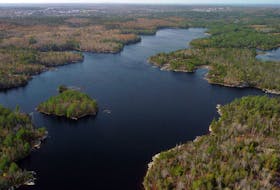Nova Scotia may have an abundance of untapped shale gas with some of the largest deposits here in Cumberland County, but if the latest opinion poll is any indication, most Nova Scotians are opposed to its development.
The poll from MQO Research released this spring found only 18 per cent of Nova Scotians support fracking in the province. Five per cent of those polled strongly support the practice to extract oil and gas, while 13 per cent said they support it.
That’s compared to 28 per cent who said they oppose fracking, and 21 per cent who said they strongly oppose it. Another 20 per cent said they neither support or oppose fracking, and 13 per cent said they don’t know. Stephen Thomas, the energy campaign co-ordinator for the Ecology Action Centre told the Chronicle Herald Nova Scotians know that fracking is not worth the risk and we have much better options for creating jobs here in the province.
What is really at issue here is the process of extracting that resource. People opposed to shale gas development are concerned about the potential environmental impact of hydraulic fracturing, also known as hydro-fracking. The process involves injecting water, chemicals and sand into the earth at high pressure to fracture shale rock to release the natural gas within it. Opponents are justifiably concerned about the harm it can create for groundwater supplies. There have been environmental horror stories we certainly don’t want to see repeated in this region.
We have heard the reports of poisoned water courses and contaminated drinking water. I read one report which points out that over a 20-year timescale, shale gas has a higher greenhouse gas footprint than coal and oil. That's because of the conveniently forgotten role of methane, a potent greenhouse gas, which is released during shale gas fracking. Nova Scotia already has a 2014 report from a panel led by David Wheeler indicating much more study is needed to determine the health, environmental, economic and community impact of fracking before endorsing the practice.
Quite frankly, I think the scientific evidence that has already been produced leaves little doubt that the risks of such extraction methods far outweigh the long term benefits. As a nation already committed to reducing our carbon foot-print and moving away from fossil fuels, why are we even debating this issue in 2018? If we believe the future growth of our economy, particularly in Cumberland County, is in renewable energy, then it is time to put an end to thoughts of tapping the potential of onshore shale gas.
Geoff deGannes is the past chairman of the Tantramar Radio Society. His daily commentaries can be heard on 107.9 CFTA.

![['Commentary with Geoff deGannes']](https://saltwire.imgix.net/commentary-with-geoff-degannes-3157216.jpg?cs=srgb&fit=crop&h=568&w=847&dpr=1&auto=compress%2Cenhance%2Cformat)







